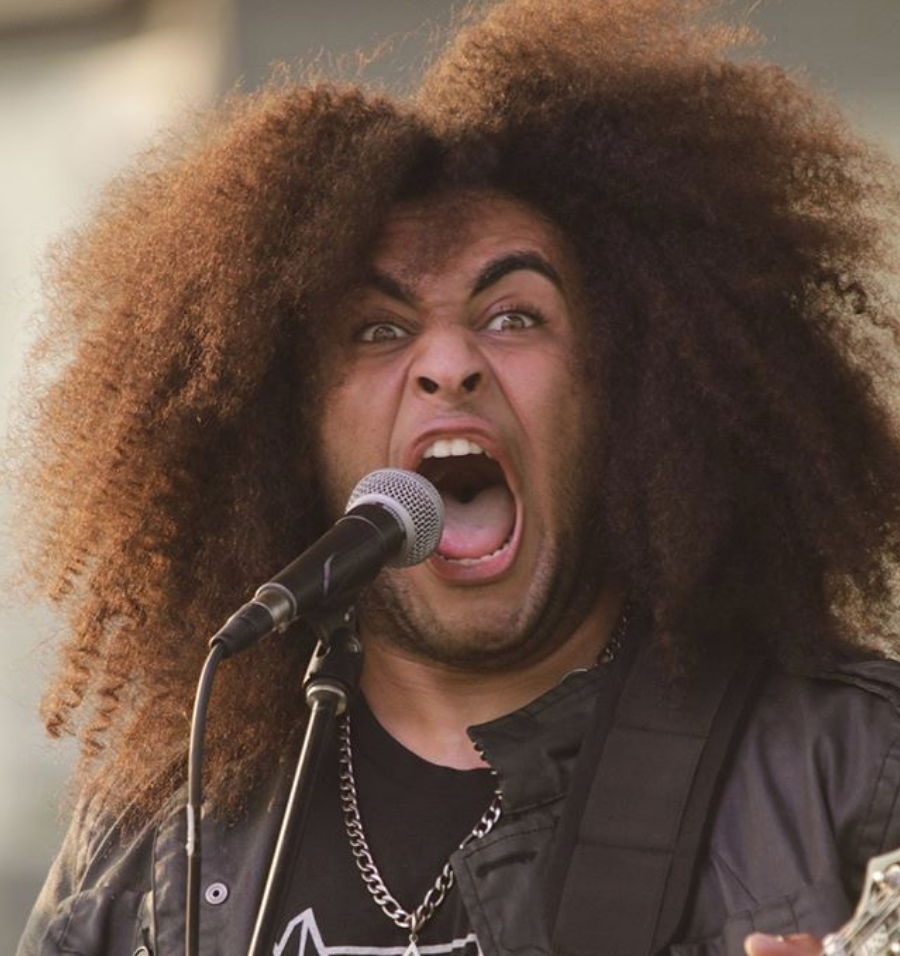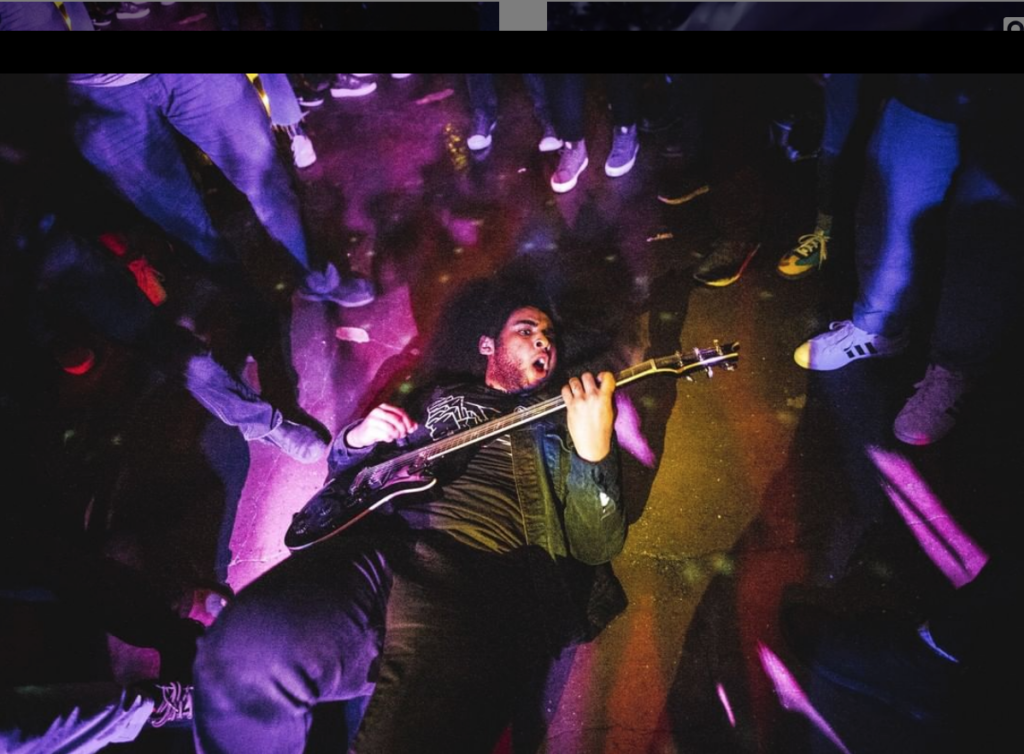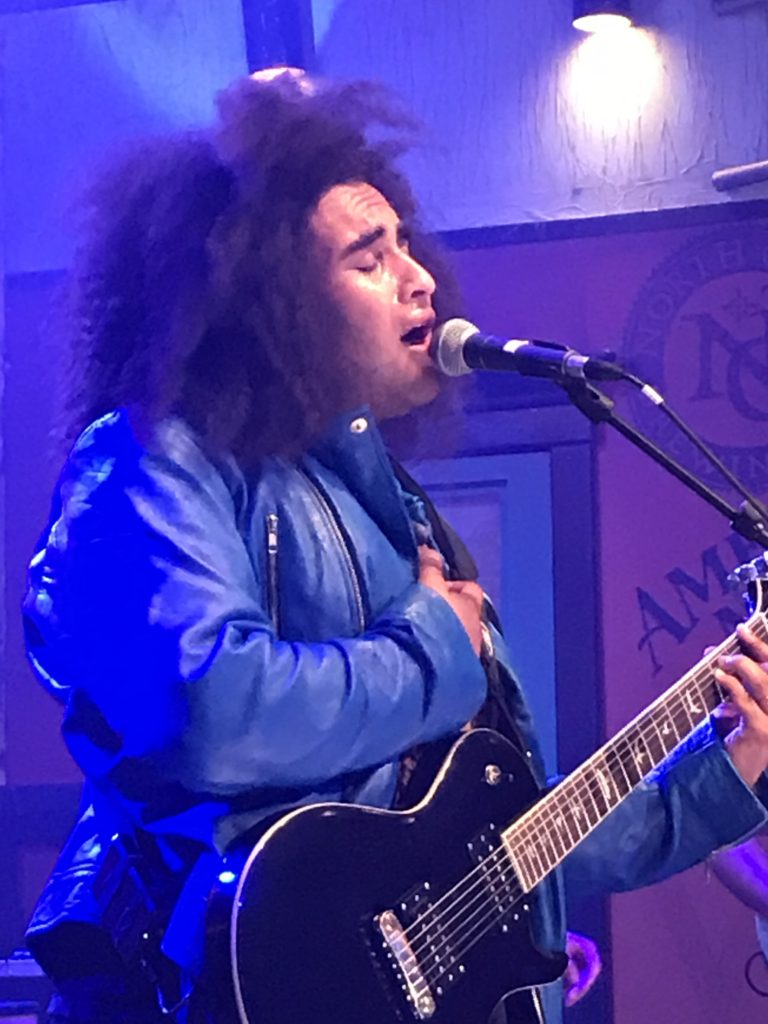King Youngblood Reigns with Art & Activism: Gypsy Temple’s Cameron Lavi-Jones, Interviewed

Interview by Odawni AJ Palmer
Good things come to those who persist and work hard, and that’s absolutely the case with Seattle alt-rock band Gypsy Temple’s debut album, King Youngblood. Frontman Cameron Lavi-Jones has spent the last ten years working on the album, an exceptional display of persistence considering he’s just 20 years old.
The band’s 11-song record is a sonic amalgam of 90s alt-rock nostalgia, with hard-hitting head bangers like “Heavy Handed” and “Forget About It” (think Alice in Chains and Rage Against the Machine), and a rock sound mellowed by the orchestral swell of an electric cello. Frontman Cameron Lavi-Jones’ smooth and sturdy Reggie Watts-esque vocals provide the band’s center (check out their song, “King Youngblood”). The band’s undeniable talent is fully fleshed-out on the record, thanks to a production team that includes multi-platinum producer Phillip A. Peterson (A$AP Rocky, Portugal the Man, Lorde) and KVRU 105.7 FM Program Manager Maurice Jones Jr. (Neville Brothers, Peter Gabriel, SongCatchers).

With their first album, Gypsy Temple (frontman/vocalist/guitarist Cameron Lavi-Jones, guitarist/vocalist Martin Creed, bassist Hamoon “Moon” Milaninia, electric cellist Cory Cavazos and drummer Kai Hill) has concocted a new brand of alt-rock that definitely sets a high bar of musicianship. Lyrically, the album also plays like a musical guidebook to life: This band can genuinely rock your socks off, all while imparting some inspired and hopeful messages–don’t give up, be good to yourself, know you’re not alone, and know that there’s support out there for you.
In early 2018, when the band was finishing the album, I had the opportunity to interview Lavi-Jones about the band, their music, and mental health. After our chat, it was clear that Gypsy Temple does much more than make good music: They do good by prioritizing activism as part of their band identity. Currently, they’re partnered with the National Alliance for Mental Illness (NAMI) in their “Hold Your Crown” campaign to address youth mental health issues.
I read that you started making music at three; and then at ten, you convinced two friends to start Gypsy Temple with you.
The two founding members of Gypsy Temple, which was more of a conceptual project, are two people I played with in the school orchestra – Taylor (upright bass) and Blair (cello). Taylor and I were on the bus one day I was like, “Do you wanna come over and jam sometime? Not that we really know what we’re doing but do want to?” The three of us came together and it just kinda clicked.
The group we have now, I mean –dear God– we are always just so excited to go see each other.
What was the concept?
The concept was always, and it still is, honest but focalized original forms of storytelling. [But] we’re not only trying to deliver honest stories from ourselves. We’re also young people, going through trials and tribulations like finding your place in the world, and understanding emotions you don’t really understand yet.
What does the band’s creative process look like?
I’m doing most of the songwriting in terms of the lyrics. But where it gets a lot more interesting and more musical is when I’m presenting an idea to the band. Any Gypsy Temple song starts off with an emotion, a story, an experience. It might be mine, it might be somebody else’s, it might be a band member’s. But it starts, at the ground level, with a feeling. And even in cases where you might not understand the feeling, it’s still starting with something very basic; very human. From there, it’s about finding and using different tools to articulate that feeling through music.
I think that powerful artists are the ones that really listen to themselves and the world around them, especially relaying this to mental health in terms of understanding yourself and making sure you’re thinking about what’s healthy for yourself.
I wanted to delve into mental health. Is there anything you’d like to say about music and mental health, in general?
You can’t have a conversation about great artistry without also having a conversation about mental health. It’s especially vital in understanding your favorite artist. Regardless of whether they’re on more of a grassroots level and just started picking up an instrument…or if it’s like Kid Cudi, Donald Glover, Jay-Z or Beyoncé. Everybody has to be honest in a lot of ways and reflect part of themselves in their music.
It’s very instinctual and it’s very therapeutic in that way. For me, I’d be crazy-and-a-half if I couldn’t play, you know?
Totally. Have you seen a therapist?
I just started this year. Super dope! I’m a big fan of therapy. Being able to externalize is super dope. If you’re speaking [your thoughts] into existence, you have to be honest about it because you’re being honest with yourself. Therapists are really good at tapping the right buttons to be like, “Aah, see? You said it! I heard you… Big-ups to my therapist, Kayla!”

Why did you decide to seek therapy?
I think that there’s a lot happening; especially being a person of color. I’m a black Jew. You don’t see a whole lotta black Jews on the earth. So I sought out therapy because of being a super minority person of color, [facing] the stresses of school, and trying to have a career so young, so seriously.
My biggest issue since I was growing up…and many other people work with this as well…is that whole feeling of not feeling good enough. I’ve been living with that type of mentality for so long because that is what gives me my drive. The fact that I’m not satisfied with something is what’s driving me to go so hard with Gypsy Temple. It’s what’s driving me to make these songs and to do all this business stuff at just 19. It’s also incredibly antagonizing on yourself, because the mistakes you make are a lot heavier. But you have to make them to learn in the first place. It’s this constant balance between feeding your fire and being burned by it at the same time.
I’m not gonna lie, when I had my first therapy session, I was a little nervous but as soon as I got in there, it was like, “Hey, how are you? I care about you. Let’s get it.” It’s less going and talking to a doctor than [it is] talking with somebody who’s trying to help you. I recommend it to people, “Dude, like, have you ever tried therapy? It’s dope as hell!”
What would you say to a teenager who’s having a hard time and feeling really lost?
A quote comes to mind. Dan Harmon, who’s the writer for “Rick and Morty” and “Community,” was asked for advice about how he copes with depression… He said…you need to be able to distinguish between what’s real and what’s reality. Your feelings are real and your feelings are valid, and they’re not coming from a place of just complete ambiguity. Your feelings are coming from a place that has a history or has some type of sparking emotion.
Understanding but making sure to separate those two concepts is majorly key for anybody dealing with any type of issue regarding mental health, regardless of if you have a major support system around you or not, because at the end of the day, it’s still you that has to look out for you first and foremost. I think a lot of it is just kinda understanding the real vs. reality thing and not being afraid to ask for help. Reaching out is a form of strength.
Gypsy Temple are in the thick of their King Youngblood Reigns Tour #1 of the west coast. Their shows run through August, including a set Friday, August 9 at Doe Bay Fest 2019. Tour information and tickets available here.